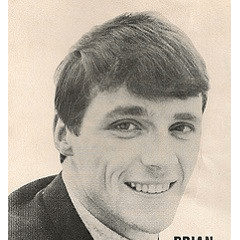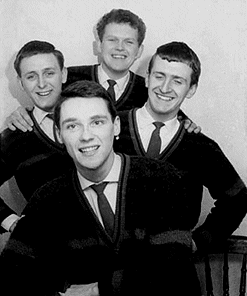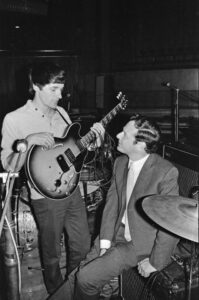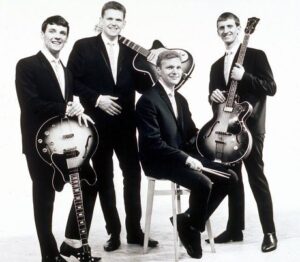A Site About Dead Musicians and How They Got That Way

Brian O’Hara: Age 58 | Cause Of Death: SUICIDE
(b. Liverpool, Mar. 12, 1942, d. June 27,1999)
Brian O’Hara, former singer and guitarist with the Fourmost, a 1960s Liverpool group that shared a manager with the Beatles and had hits with songs written by John Lennon and Paul McCartney, was found hanging at his home…He was 58. Liverpool police found O’Hara in the Wavertree area of the northern English port city. The group had half a dozen hit singles from 1963-65, including “Hello Little Girl” and “I’m In Love” by Lennon and McCartney.
Obituary
'Merseybeat' singer found hanged
Brian O’Hara, singer and guitarist with sixties ‘Merseybeat’ pop group, The Fourmost, has been found dead at his home in the Waverley district of Liverpool. Liverpool police have said that O’Hara, aged 58, was found hanged and that an inquest will be held today (Thursday). The Fourmost – O’Hara, Mike Millward (guitar/vocals), Billy Hatton (bass) and Dave Lovelady (drums) were formed in 1962 and were picked up by Beatles’ manager Brian Epstein in the same year that his management firm signed up Gerry and the Pacemakers, Billy J. Kramer and Cilla Black. The band had several hit singles in the early sixties, the first two ‘Hello Little Girl’, which reached number nine in the chart, and ‘I’m In Love’, were both written by John Lennon and Paul McCartney. Their biggest hit, ‘A Little Loving’, reached number six in April 1964. Originally called The Four Jays, then The Four Mosts, their name was shortened by Brian Epstein when he took over their management.

During their career they released only one album, 1965’s ‘First and Fourmost’, appeared in the ‘pop-film’ film ‘Ferry Cross The Mersey’, and toured consistently supporting the big groups of the day, including The Beatles, Gerry and The Pacemakers and even the Rolling Stones. However an illness which struck Millward in 1965 lost the band a great deal of its momentum and they had their last hit, ‘Girls, Girls, Girls’, at the end of that year.
LIVERPOOL, England (AP) – Brian O’Hara, former singer and guitarist with the Fourmost, a 1960s Liverpool group that shared a manager with the Beatles and had hits with songs written by John Lennon and Paul McCartney, was found hanging at his home on Sunday. He was 58.
Liverpool police found O’Hara in the Wavertree area of the northern English port city. An inquest will convene Thursday.
Formed in 1962, the Fourmost was managed by Brian Epstein, who also managed the Beatles. The group had half a dozen hit singles from 1963-65, including “Hello Little Girl” and “I’m In Love” by Lennon and McCartney.
Beatles Contemporary Found Hanged
Brian O’Hara, lead singer of the Fourmost, a 1960s Merseybeat group that was a contemporary of the Beatles, was found hanged in his Liverpool, England, home Sunday, according to the Associated Press. He was 58. The Fourmost were managed by late Beatles manager Brian Epstein and enjoyed UK hits with “Hello Little Girl” and “I’m in Love,” both written by Beatles John Lennon and Paul McCartney.
Biography
Brian O'Hara (b. Liverpool, Mar. 12, 1942)
Fourmost
The Fourmost were originally known as the Blue Jays, then the Four Jays, and then the Four Mosts, before finally taking on the name under which they finally succeeded. Lead guitarist and singer Brian O’Hara (b. Liverpool, Mar. 12, 1942) and rhythm guitarist and singer Mike Millward (b. Bromborough, Cheshire, May 9, 1942) had a pleasing attack on their instruments and sang well enough, even harmonizing well, and with bassist-singer Billy Hatton (b. Liverpool, June 9, 1941) and drummer (and sometime singer) Dave Lovelady (b. Liverpool, Oct. 16, 1942), the Fourmost were one of the better combos working Liverpool in the early 1960’s. They could rock hard, with a crisp guitar sound and vocals that wailed convincingly, and Hatton’s bass work had a nicely melodic
sound–the group lacked the distinctiveness of Gerry & The Pacemakers at their best, but were never as sappily sentimental as their major sub-Beatles Liverpool rivals could get, and had a livelier, leaner, and more refined sound than such competitors as the Swingin’ Blue Jeans.

The Fourmost’s fortunes took a sharp turn upward in 1963 when they were given the nod by Brian Epstein and became a part of his stable of Liverpool-based acts. Their bookings improved and they were signed to EMI’s Parlophone label, where they were recorded by George Martin. The band also got access to a pair of Lennon-McCartney originals (“Hello Little Girl,” “I’m In Love”) that got them noticed, and they peaked in April of 1964 with the single “A Little Lovin’,” which got to No. 6 in England. Unfortunately, none of the Fourmost were songwriters, and this left them at the mercy of outside inspiration and outside sources for songs, which quickly dried up as dozens of rival bands started covering the same material.
They also looked a bit stiff on stage and on television, which was a problem as the bands around them got bolder in their presentations. Additionally, like a lot of early Liverpool acts, the Fourmost were oriented toward music careers that left room for cabaret-style humor, believing–as had been the case before the Beatles–that a band eventually branched out from straight ahead rock ‘n roll.
Their music included a fair lacing of comedy tracks amid perfectly respectable covers of numbers like “The In Crowd” and “Some Kind of Wonderful.” Once the music around them began maturing in a different direction, into more advanced forms of rock ‘n roll rather than toward pop, they found themselves on the outside looking in–in 1965, while the Beatles were taking the first steps into the druggy ambience and the diverse folk and Indian sounds that would spice their second flourishing, and the Rolling Stones were shaking up the airwaves with “Satisfaction,” the Fourmost were covering “Why Do Fools Fall In Love” (a great song, to be sure, but not exactly aiming high in ambition). With a few breaks and more focus, they might’ve been a somewhat more pop oriented equivalent to the Action, but it wasn’t to be.
The group never charted a single after the spring of 1964, despite an attempt in the summer of the 1966 to piggy-back once more on the Beatles’ work with a cover of “Here, There and Everywhere.” The death of Mike Millward from leukemia in 1966 doomed the band’s prospects, although as late as 1969, Paul McCartney was still throwing some help their way. By then, they were fixtures on the cabaret circuit, and long since forgotten by most of the public. — Bruce Eder, All-Music Guide


